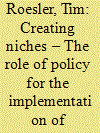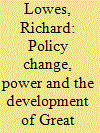| Srl | Item |
| 1 |
ID:
162922


|
|
|
|
|
| Summary/Abstract |
Visions of alternative and more sustainable energy systems are commonly associated with the development and innovation of renewable energy technologies. Geels (2002) notes that regime transition is affected by a set of technological, socio-economic, organisational, political, institutional and region-specific dimensions that can be triggered by niche developments. Indeed, the transition toward a sustainable energy regime is strongly influenced by governance and regulatory frameworks extending from a global to a local scale, which set boundaries and incentives for the direction in which energy transition can evolve. Since 2007, several local initiatives have emerged in the county of Marburg-Biedenkopf in Germany promoting the use of biomass on a local scale. These initiatives successfully established locally owned cooperatives to run a decentralised heating supply infrastructure to supply their households. This paper highlights the role of multi-scalar policy processes that are allowing for the development of bioenergy villages and provides details on the role of regional and local policy processes. Supplementing the national policy framework with regional and local policy makers is a key factor in implementing bioenergy villages.
|
|
|
|
|
|
|
|
|
|
|
|
|
|
|
|
| 2 |
ID:
166733


|
|
|
|
|
| Summary/Abstract |
The role of socio-political power is central to the development of policy, but systematic analyses of power associated with the development of energy policy are rare. Power is also an important yet somewhat under-researched aspect of socio-technical transitions research. The Renewable Heat Incentive (RHI) policy aims to increase deployment of low-carbon heat in Great Britain and begin a transformation to a low carbon GB heat system. This article analyses the socio-political power associated with the development of the RHI policy based on Lukes' ‘dimensions of power’ approach using a methodology based on triangulation. We identify a number of policy change episodes during the development of the RHI and describe the influence of key actors on the policy. Despite the common assumption of the power of incumbents, we show that those actors with niche technological expertise, close relationships with Government actors and actors within the administration have been the most powerful drivers of policy development and change. Niche actors sped up the introduction of the RHI scheme and have also had some success in increasing relative support for biomethane injection. The power of a civil servant to slow the introduction of the domestic element of the RHI has also been identified.
|
|
|
|
|
|
|
|
|
|
|
|
|
|
|
|